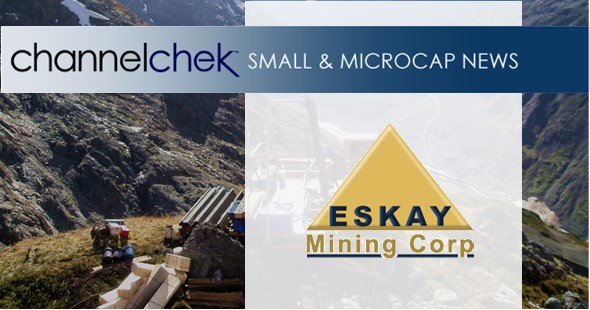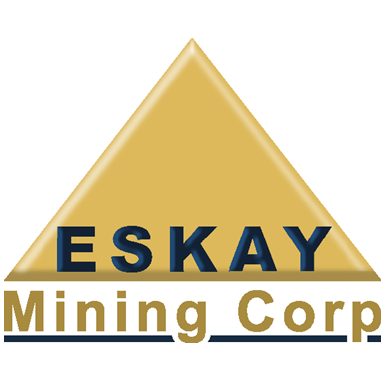
Research, News, and Market Data on ESKYF
October 7, 2022
TORONTO, ON / ACCESSWIRE / October 7, 2022 / Eskay Mining Corp. (“Eskay” or the “Company”) (TSXV:ESK) (OTCQX:ESKYF) (Frankfurt:KN7)(WKN:A0YDPM) is pleased to announce it has completed 29,500 m of diamond core drilling substantially fulfilling its planned meterage for the 2022 property wide exploration campaign. Over the past four months, drilling has been conducted at multiple volcanogenic massive sulfide (“VMS”) targets including Jeff, Jeff North, Scarlet Ridge, Scarlet Valley, and Tarn Lake. Drilling has now been completed and the Company is currently demobilizing.
“As the 2022 exploration season is drawing to a close, we have met all of our primary objectives,” commented Dr. John DeDecker, Eskay Mining’s VP of Exploration. “We have now drill tested the full extent of the TV-Jeff trend, conducted systematic mapping and extensive rock chip sampling of the Scarlet Ridge-Tarn Lake trend, and conducted exploratory drilling at three highly prospective and previously undrilled targets, Scarlet Ridge, Scarlet Valley and Tarn Lake. Our prospecting and mapping teams have also conducted reconnaissance level work at Spearhead, Vermillion, Tet, SIB-Lulu, Excelsior, and Harrymel Valley, laying the groundwork for an expansive push to drill test numerous additional targets in 2023. “
Step-out drilling of the Upper Massive Sulfide Zone has confirmed that semi-massive and massive sulfide mineralization overlies the entire stockwork zone at TV thus significantly expanding the along-strike and down-dip extent of this important body of mineralization.
Maiden drilling at Scarlet Valley and Tarn Lake yielded core displaying intense stockwork and replacement-style sulfide mineralization and hydrothermal alteration focused along east-west trending andesite dikes. Replacement-style mineralization and hydrothermal alteration of volcaniclastic debris flow breccia at Scarlet Valley provide an encouraging sign that the VMS feeder structures may have fed laterally extensive replacement-style mineralization along favorable stratigraphic horizons.
Highlights from TV Drilling:
- Drilling at TV, the last to be undertaken this season, focused on extensions of the Upper Massive Sulfide Zone discovered in 2021. Drill holes TV22-105, 107, 109, 110, 111, and 113 target areas east and up-section from the large stockwork zone defined by drilling in 2021 (Figure 1). All of these holes have intercepted semi-massive to massive sulfide over intervals ranging from 4-18 meters and tens of meters of additional footwall replacement-style and stockwork sulfide mineralization hosted by andesite and dacite breccia, and silicified mudstone (Figures 2-4).
- Extensions of the Upper Massive Sulfide Zone overlie intensely silicified mudstones in the stockwork zone, consistent with a near-seafloor position.
- Handheld XRF analyses of massive and semi-massive sulfides hosted by carbonaceous mudstone display strongly anomalous concentrations of pathfinder elements Ag, As, and Sb; stockwork mineralization displays strongly elevated levels of pathfinder elements As and Sb; and readings from massive sulfide display very high concentrations of pathfinder elements Ag, As, and Sb. Handheld XRF cannot reliably measure Au concentrations.
Highlights from Tarn Lake Drilling:
- Drilling at Tarn Lake focused on a large gossanous outcrop associated with visible sulfide and sulfosalt mineralization hosted within Eskay rhyolite (Figure 5). Sulfide mineralization is focused around east-west trending andesitic dikes that are interpreted to have exploited the same syn-volcanic structure that fed VMS forming fluids. Nine drill holes were completed at Tarn Lake.
- Hole TN22-10 intercepted approximately 10 m of semi-massive replacement style mineralization (Figures 6 and 7), and ubiquitous disseminated sulfide mineralization associated with sulfide stockwork (Figure 7).
- Early results show pervasive stockwork and disseminated sulfide mineralization in all drill holes completed at Tarn Lake. Handheld XRF readings display very high concentrations of pathfinder elements Ag, As, and Sb within stockwork and semi-massive and massive sulfide mineralization. Handheld XRF cannot reliably measure Au concentrations.
- Rhyolite-hosted sulfide mineralization at Scarlet Knob, situated approximately 1 km to the northeast of Tarn Lake, is likely structurally offset from the Tarn Lake VMS system, displaced along a dextral shear zone.
Highlights from Scarlet Valley Drilling:
- Drilling at Scarlet Valley (Figure 8) targeted a large east-west trending gossan associated with intense stockwork sulfide mineralization. Mineralization is focused along east-west trending andesite dikes that crosscut volcaniclastic debris flow breccia. Debris flow breccia in the western part of Scarlet Valley contains rhyolite clasts, while debris flow breccia to the east is dominated by andesite clasts. Both andesite and the debris flow breccia exhibit replacement-style sulfide mineralization (Figures 9-13), in some cases, sulfide replacement being intense.
- Core from hole SV22-05 displays intense silicification and sulfide replacement of volcaniclastic debris flows, a promising sign that permeable sedimentary horizons may host lateral extensions of replacement-style mineralization.
- Handheld XRF analyses of sulfide minerals in drill core display high concentrations of pathfinder elements Ag, As, and Sb. Handheld XRF cannot reliably measure Au concentrations.
Dr. Quinton Hennigh, P. Geo., a Director of the Company and its technical adviser, a qualified person as defined by National Instrument 43-101, has reviewed and approved the technical contents of this news release.
About Eskay Mining Corp:
Eskay Mining Corp (TSX-V:ESK) is a TSX Venture Exchange listed company, headquartered in Toronto, Ontario. Eskay is an exploration company focused on the exploration and development of precious and base metals along the Eskay rift in a highly prolific region of northwest British Columbia known as the “Golden Triangle,” 70km northwest of Stewart, BC. The Company currently holds mineral tenures in this area comprised of 177 claims (52,600 hectares).
All material information on the Company may be found on its website at www.eskaymining.com and on SEDAR at www.sedar.com.
For further information, please contact:
Mac Balkam
President & Chief Executive Officer
T: 416 907 4020
E: Mac@eskaymining.com
Neither the TSX Venture Exchange nor its Regulation Services Provider (as that term is defined in the policies of the TSX Venture Exchange) accepts responsibility for the adequacy or accuracy of this release.
Forward-Looking Statements: This Press Release contains forward-looking statements that involve risks and uncertainties, which may cause actual results to differ materially from the statements made. When used in this document, the words “may”, “would”, “could”, “will”, “intend”, “plan”, “anticipate”, “believe”, “estimate”, “expect” and similar expressions are intended to identify forward-looking statements. Such statements reflect our current views with respect to future events and are subject to risks and uncertainties. Many factors could cause our actual results to differ materially from the statements made, including those factors discussed in filings made by us with the Canadian securities regulatory authorities. Should one or more of these risks and uncertainties, such as actual results of current exploration programs, the general risks associated with the mining industry, the price of gold and other metals, currency and interest rate fluctuations, increased competition and general economic and market factors, occur or should assumptions underlying the forward looking statements prove incorrect, actual results may vary materially from those described herein as intended, planned, anticipated, or expected. We do not intend and do not assume any obligation to update these forward-looking statements, except as required by law. Shareholders are cautioned not to put undue reliance on such forward-looking statements.
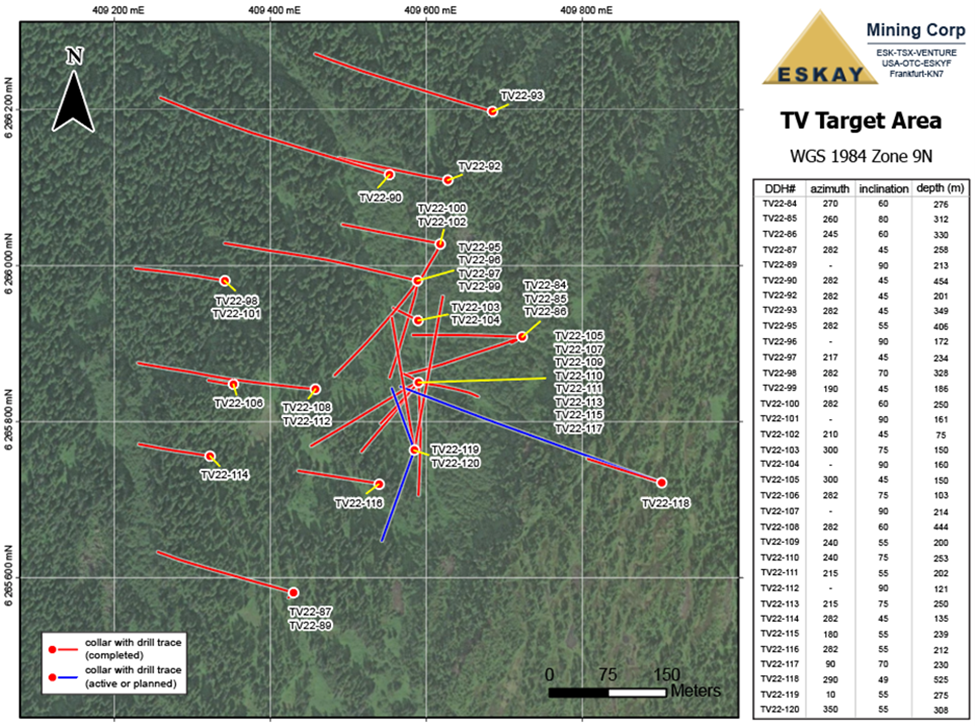
(Figure 1: Section of TV showing locations of 2022 drill holes. Drilling focused on targeting along-strike, up-dip, and down-dip extensions of the stockwork zone and massive sulfide horizons discovered in 2020-2021.
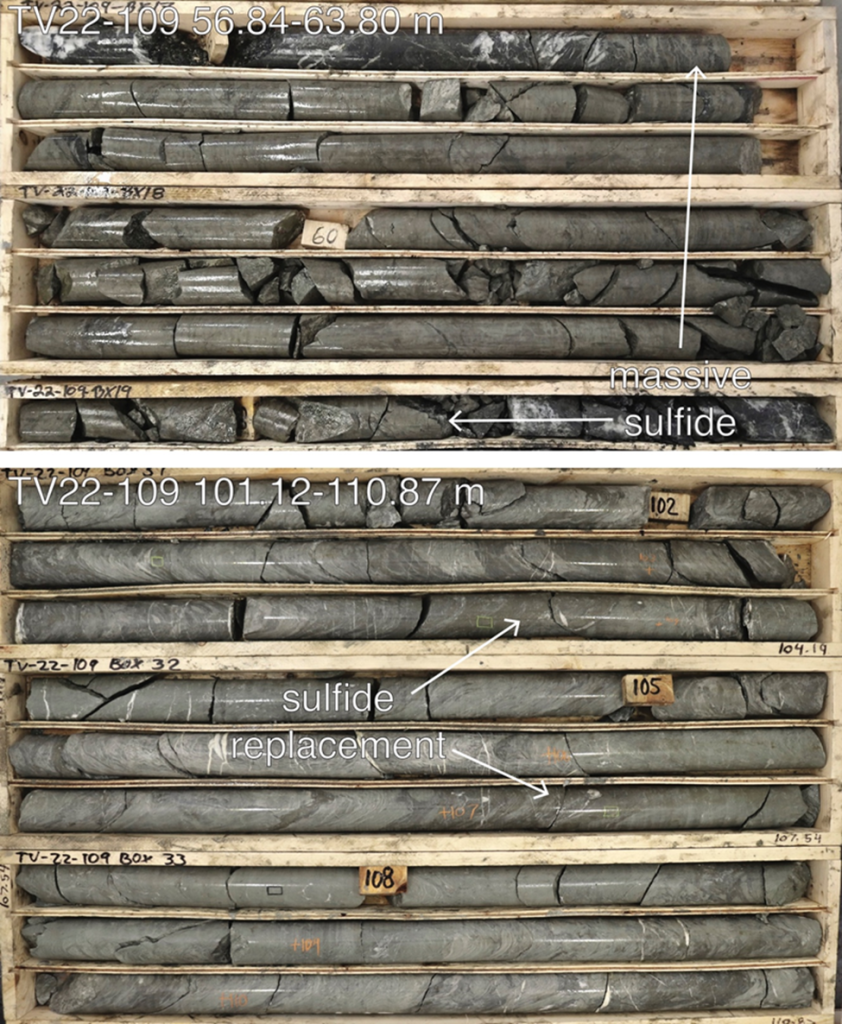
(Figure 2: TV22-109 56.84-63.80 m showing an intercept of ~6 m of massive sulfide underlain by a fault hosted by carbonaceous mudstone. Most massive sulfide at TV is fault bounded on the bottom, with a few meters of mixed and broken massive sulfide and carbonaceous mudstone before the stockwork zone is intercepted. Handheld XRF analyses of the massive sulfide show very high concentrations of the Au pathfinder elements Ag, As, and Sb. Handheld XRF cannot reliably measure Au concentrations.TV22-109 101.12-110.87 shows a typical intercept of the replacement-style mineralization hosted by andesite breccia.)
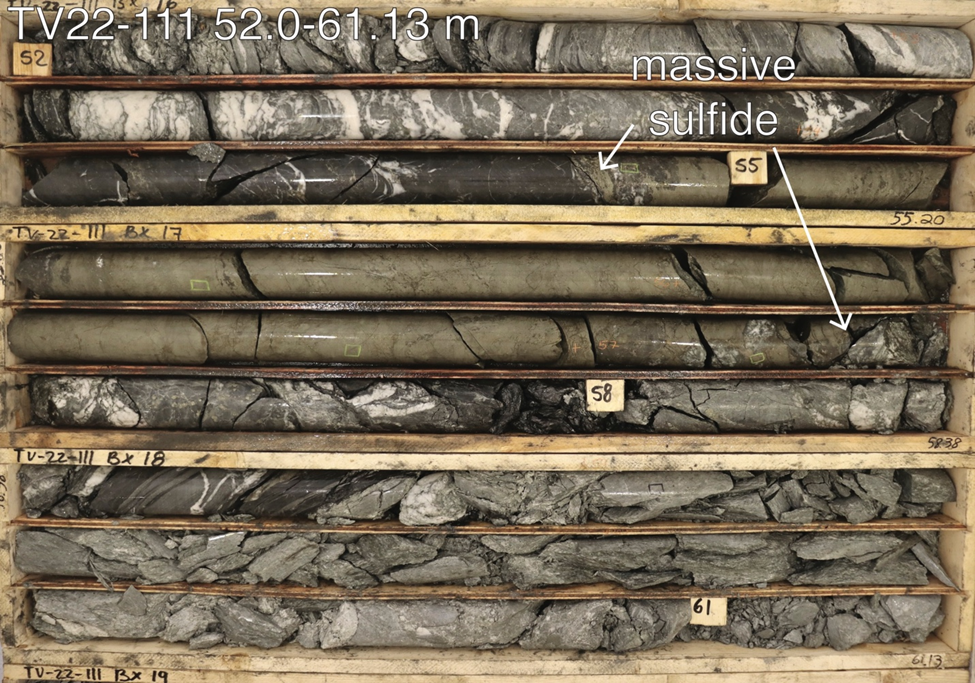
(Figure 3: TV22-111 52.0-61.13 m showing a mudstone-hosted massive sulfide intercept. Sulfide mineralization begins ~10 m above the massive sulfide horizon, and is characterized by ~20% pyrite hosted within sheared peperitic andesite and dacite. The massive sulfide is underlain by faulted mudstone and andesite breccia, both of which contain appreciable sulfide mineralization. Handheld XRF analyses of the massive sulfide show very high concentrations of the Au pathfinder elements Ag, As, and Sb. Handheld XRF cannot reliably measure Au concentrations.)
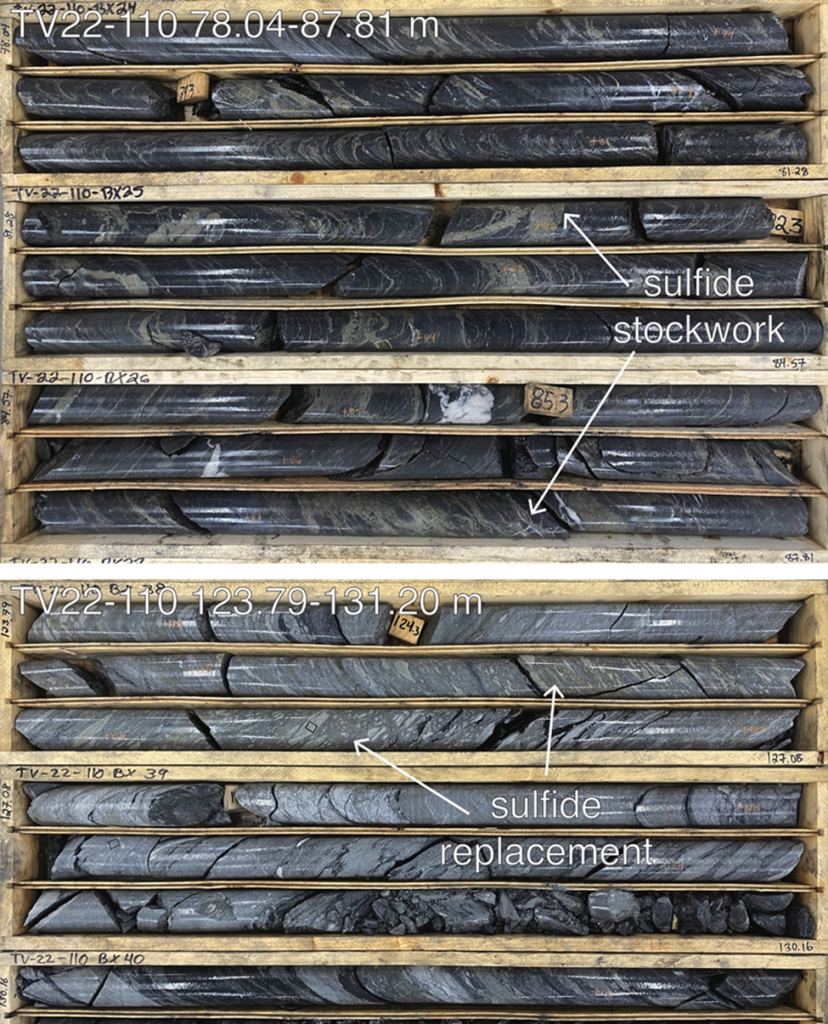
(Figure 4: TV22-110 78.04-87.91 showing stockwork sulfide mineralization hosted by intensely silicified mudstone. Handheld XRF analyses of sulfides hosted by silicified mudstone invariably show very high concentrations of the Au pathfinders Ag, Sb, and As. Handheld XRF cannot reliably measure Au concentrations. TV22-110 123.79-131.20 showing a sheared andesite breccia hosting replacement-style sulfide mineralization.)
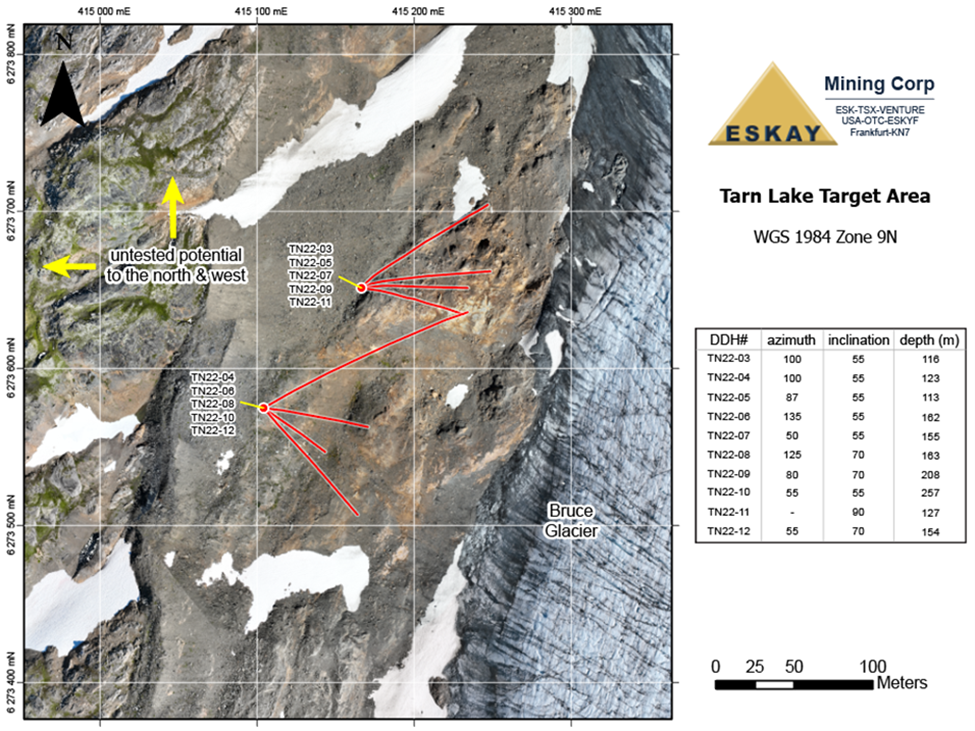
(Figure 5: Map showing the drill traces for Tarn Lake shown with drone imagery of gossanous rhyolite focused around east-west trending andesite dikes.)
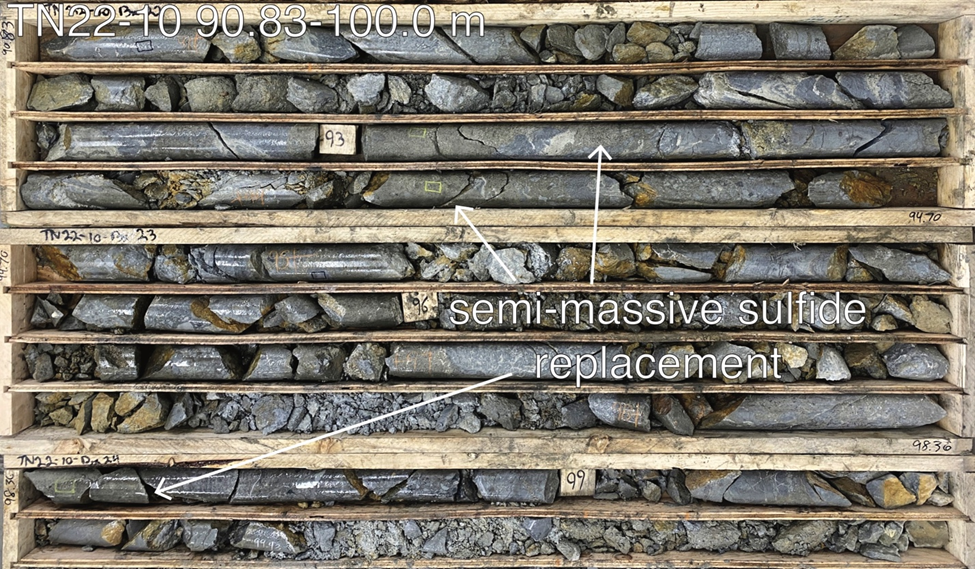
(Figure 6: TN22-10 90.83-100.0 m showing semi-massive replacement style sulfide mineralization hosted by Eskay rhyolite. This interval shows consistently high concentrations of the pathfinder elements Ag, As, and Sb.)
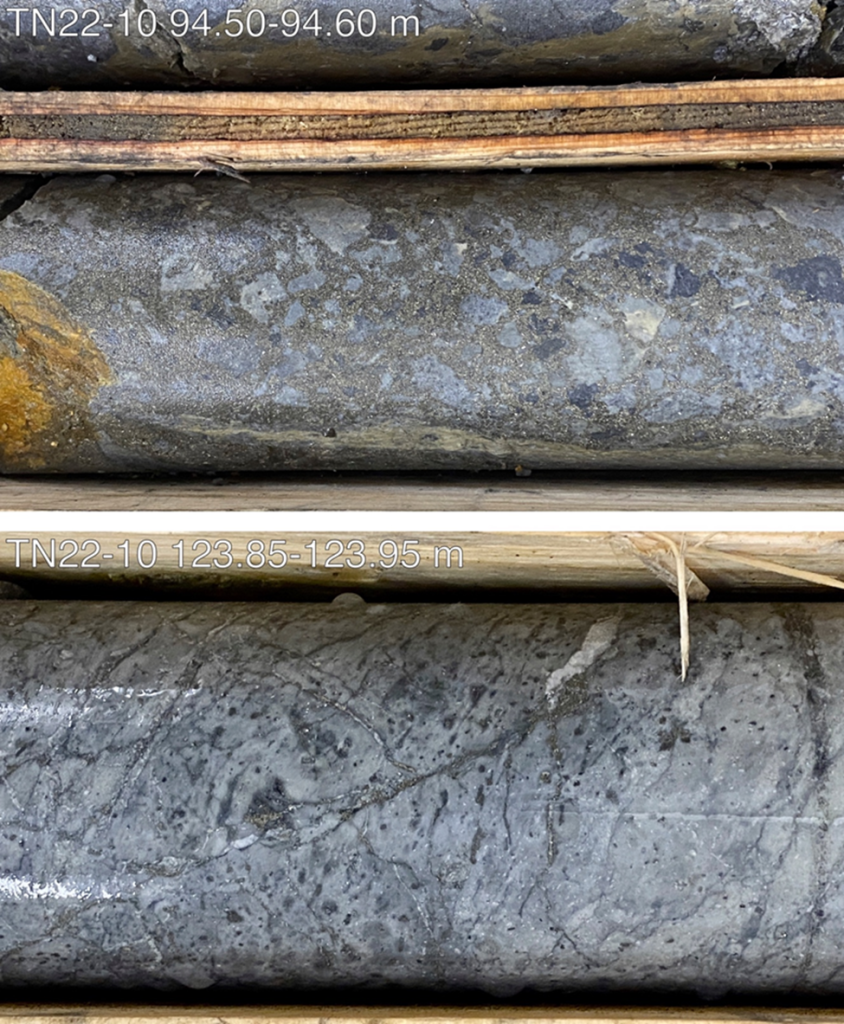
(Figure 7: TN22-10 94.50-94.60 showing a close-up of semi-massive replacement-style mineralization hosted by rhyolite breccia. This type of sulfide mineralization shows the highest pathfinder element concentrations. TN22-10 123.85-123.95 showing stockwork sulfide and vesicle-hosted disseminated sulfide mineralization. This style of mineralization is ubiquitous at Tarn Lake. Accurate handheld XRF analyses of disseminated mineralization is impossible given the small size of the disseminations and consequent mixed analyses of sulfide and host silicate material. Analyses of larger stockwork veins throughout the Tarn Lake drill holes shows the presence of Ag, suggesting that disseminated sulfides may host Ag as well.)
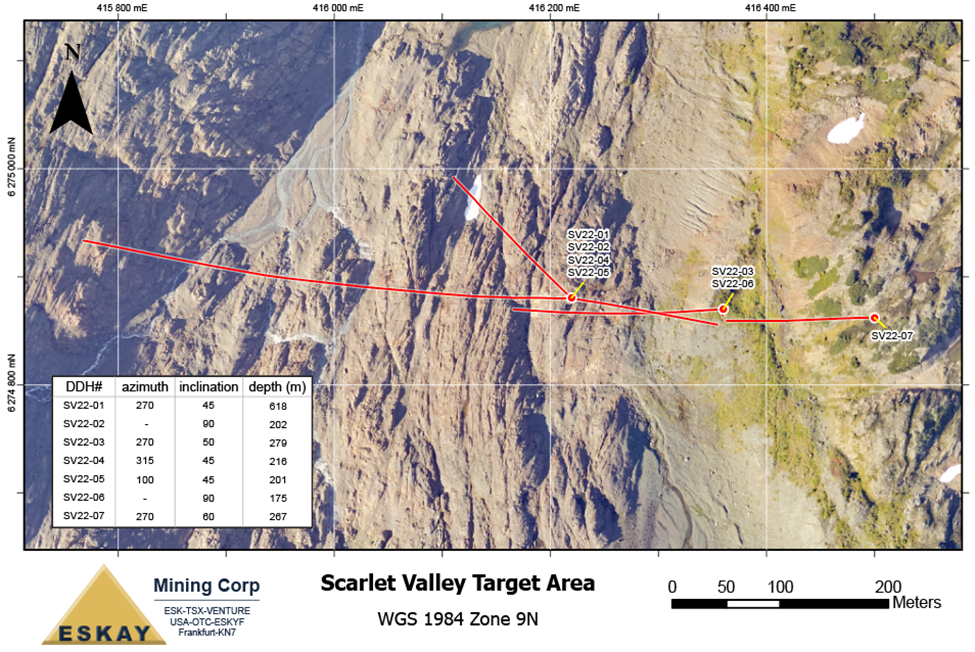
Figure 8: Map showing the drill traces for Scarlet Valley shown with drone imagery of gossanous rhyolite-bearing volcaniclastic debris flow deposits focused along east-west trending andesite dikes.
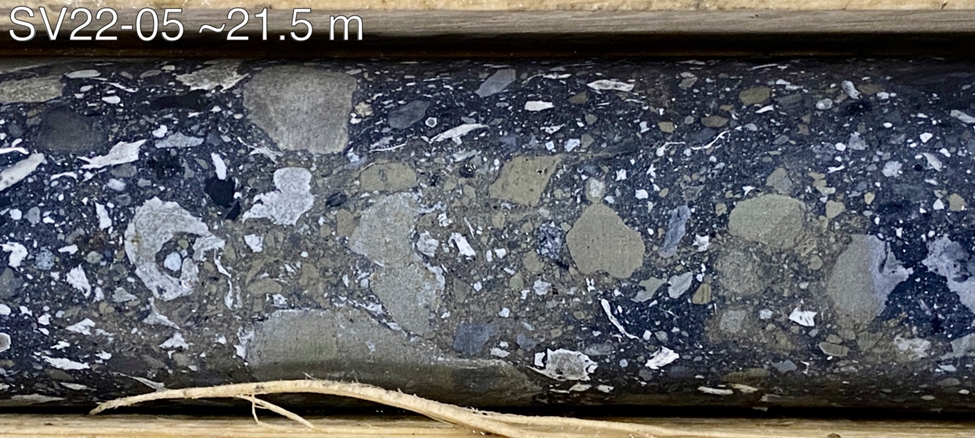
Figure 9: SV22-05 at approximately 21.5 m showing moderate sulfide replacement of both the groundmass and clasts of a volcaniclastic debris flow breccia. This observation shows that sulfide mineralization occurred after the deposition of the debris flow breccia. Volcanic clasts are andesitic in composition.

Figure 10: SV22-05 at approximately 37 m showing progression from a mineralized volcaniclastic debris flow breccia with a carbonaceous mudstone groundmass, to an intensely clay altered and silicified debris flow breccia with patchy sulfide replacement. Volcanic clasts are andesitic in composition.
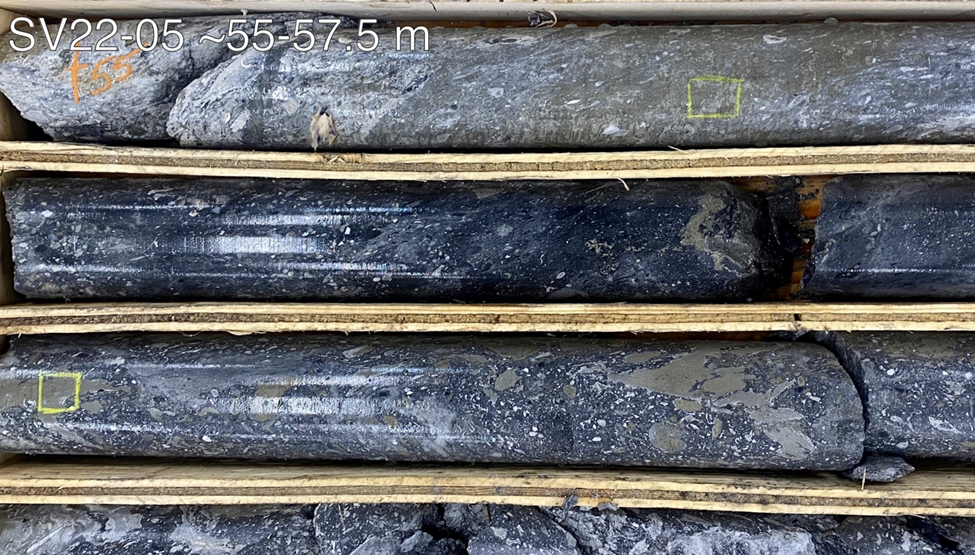
Figure 11: SV22-05 from approximately 55-57.5 m showing variably intense sulfide replacement of the host volcaniclastic debris flow breccia. This rock is intensely silicified and variably clay altered, with the lighter colored rock being more intensely clay altered.
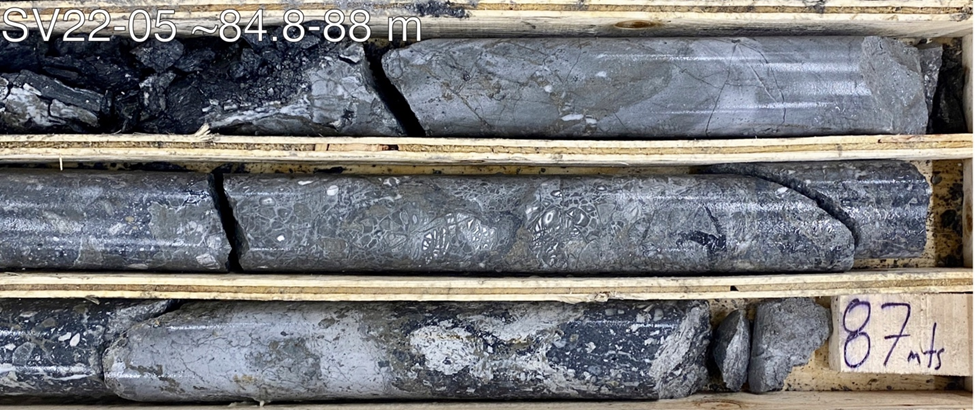
Figure 12: SV22-05 at approximately 84.8-87 showing an andesite dike adjacent to a faulted mudstone (top row), followed by a volcaniclastic debris flow breccia with large perlitic andesite clast and other andesitic fragments. Sulfide mineralization is hosted by fine fractures within the andesite, but is more widespread in the more permeable debris flow breccia, highlighting the potential for such horizons to host lateral extensions of replacement-style mineralization.
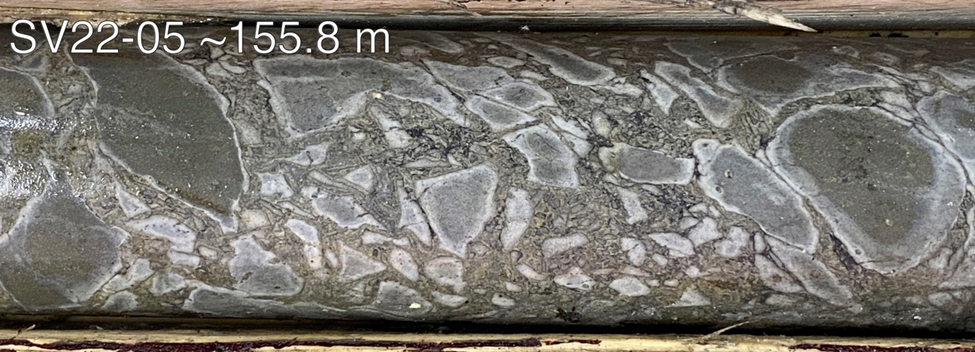
Figure 13: SV22-05 at approximately 155.8 m showing intense clay alteration and sulfide replacement of an andesitic hyaloclastic breccia. Clasts fit together well, precluding a sedimentary origin. Sulfide minerals are preferentially replacing the cores of larger breccia fragments, and infilling between hyaloclastic fragments.
SOURCE: Eskay Mining Corp.
View source version on accesswire.com:
https://www.accesswire.com/719443/Eskay-Mining-Reaches-Drilling-Goal-as-the-2022-Exploration-Campaign-Nears-Completion
